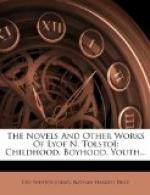“Michael Lavionitch!” I said.
“No!” he replied, as though knowing beforehand what I was about to say. “It is impossible for you to learn in that way. I am not going to earn my money for nothing.”
He put on his goloshes and cloak, and then slowly tied a scarf about his neck. To think that he could care about such trifles after what had just happened to me! To him it was all a mere stroke of the pen, but to me it meant the direst misfortune.
“Is the lesson over?” asked St. Jerome, entering.
“Yes.”
“And was the master pleased with you?”
“Yes.”
“How many marks did he give you?”
“Five.”
“And to Nicholas?”
I was silent.
“I think four,” said Woloda. His idea was to save me for at least today. If punishment there must be, it need not be awarded while we had guests.
“Voyons, Messieurs!” (St. Jerome was forever saying “Voyons!”) “Faites votre toilette, et descendons.”
XII. THE KEY
We had hardly descended and greeted our guests when luncheon was announced. Papa was in the highest of spirits since for some time past he had been winning. He had presented Lubotshka with a silver tea service, and suddenly remembered, after luncheon, that he had forgotten a box of bonbons which she was to have too.
“Why send a servant for it? You had better go, Koko,” he said to me jestingly. “The keys are in the tray on the table, you know. Take them, and with the largest one open the second drawer on the right. There you will find the box of bonbons. Bring it here.”
“Shall I get you some cigars as well?” said I, knowing that he always smoked after luncheon.
“Yes, do; but don’t touch anything else.”
I found the keys, and was about to carry out my orders, when I was seized with a desire to know what the smallest of the keys on the bunch belonged to.
On the table I saw, among many other things, a padlocked portfolio, and at once felt curious to see if that was what the key fitted. My experiment was crowned with success. The portfolio opened and disclosed a number of papers. Curiosity so strongly urged me also to ascertain what those papers contained that the voice of conscience was stilled, and I began to read their contents. . . .
My childish feeling of unlimited respect for my elders, especially for Papa, was so strong within me that my intellect involuntarily refused to draw any conclusions from what I had seen. I felt that Papa was living in a sphere completely apart from, incomprehensible by, and unattainable for, me, as well as one that was in every way excellent, and that any attempt on my part to criticise the secrets of his life would constitute something like sacrilege.
For this reason, the discovery which I made from Papa’s portfolio left no clear impression upon my mind, but only a dim consciousness that I had done wrong. I felt ashamed and confused.




